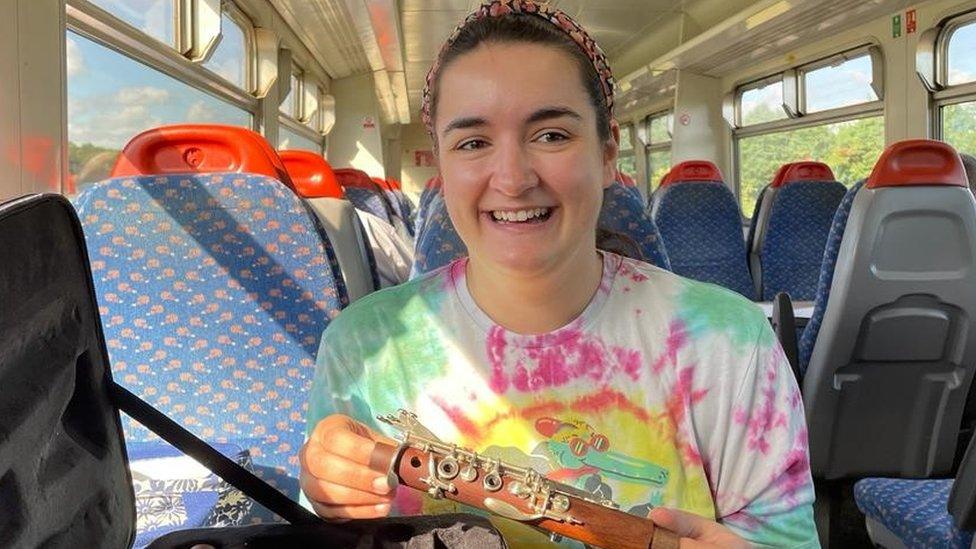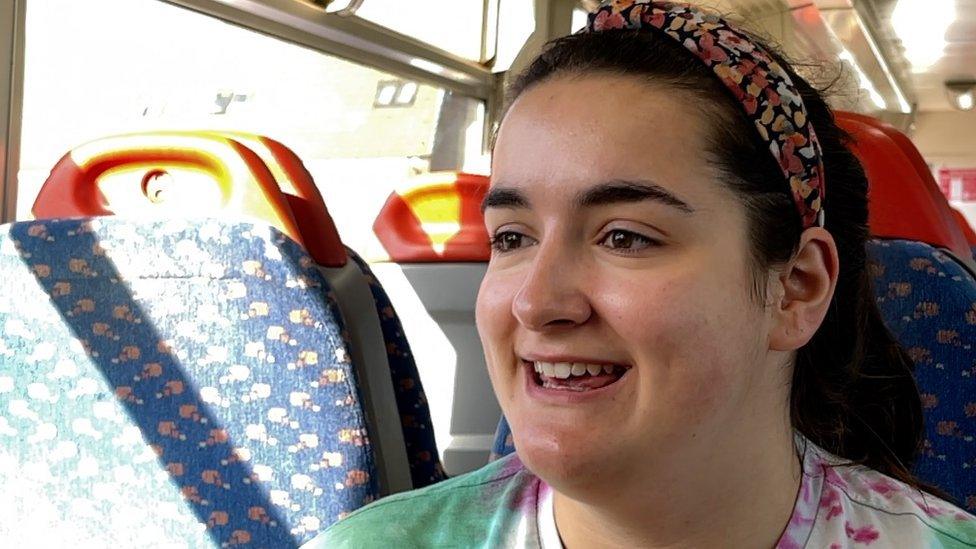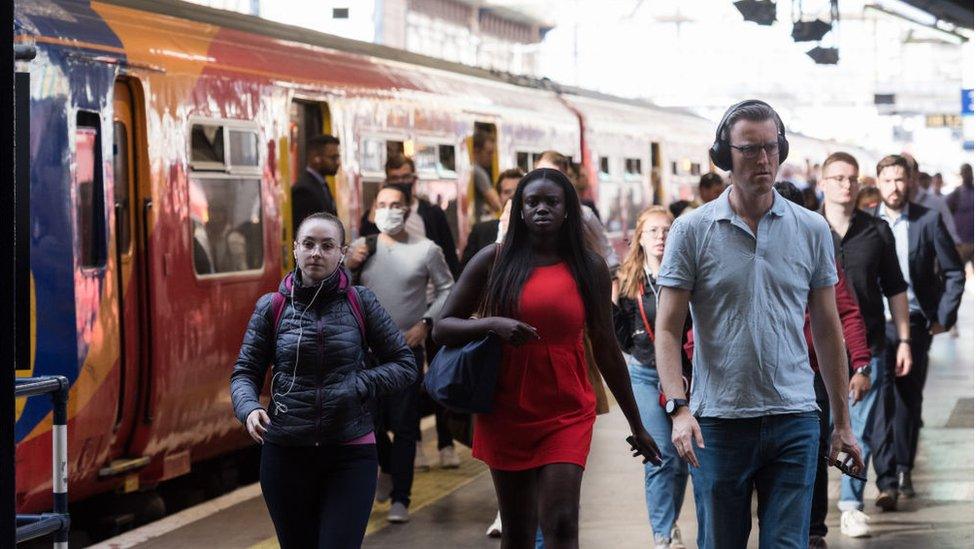Rail strike: 'Commuting by car will cost me half my wages'
- Published

Student Casey said her boyfriend would have to drive her to and from her college
Regular rail passengers have been making alternative plans this week, as the country faces the biggest rail strikes in 30 years. BBC News asks how people in the East Midlands plan to keep moving.

'It's half my day's wages'

Charlie said she would end up spending half her day's wages on commuting by car
Charlie Coyle, 35, lives in Lincoln but commutes to Nottingham every day to do agency work in a department store.
"There is currently not much work in Lincoln, so I do a commute to Nottingham each morning and evening," she said.
"If it's available, I take the train. I would prefer to do that rather than being stuck in the traffic. I use it every day.
"It just saves parking, traffic, it makes it a lot easier for me."
Of the strikes, she said: "It's not great, but if that's what needs to be done, if that's the action they need to take to be heard, then you've got to do what you've got to do.
"I do drive, so I can just get in my car and do the drive.
"I'm just a little bit of a nervous driver, especially when it comes to going into big cities, and then you have that extra parking on top.
"I prefer to take the train as I feel a little bit safer and more secure."
The record petrol prices, plus the cost of parking, was going to take a toll on her wages, she said.
"It's an impact on my wage and also on my time," she said.
"When we calculated it, [the cost of] petrol will work out the same as the train, but then we have the parking, which is £15 for the day, so that is £30 a day for me to go to work.
"That's half of my day's wage, so that does add up."

'I could have lost a week's worth of work'

David said the situation had left him stressed
David Simpson, 43, who works in car sales, said he usually travelled to work and back every day on the train.
"My work has had to make alternative arrangements for this week," he said.
"Initially they said I was not going to be able to work.
"I'm now getting a car to use, from work, and then that means I don't have to use the trains."
He said the situation had left him stressed.
"It's the uncertainty of not knowing if I was going to be able to work," he said.
"All last week, I didn't know if I was going to be able to get in and do my hours this week.
"I could have lost a week's worth of work.
"Luckily, I'm contracted, but a lot of my colleagues are on zero-hour contracts."

'There is quite a lot of stress'

Casey said she understood the reasons behind the strike
Casey Edan-Ward, 25, a musical instrument student at Newark College, says she usually catches the train between Newark, in Nottinghamshire, and Lincoln, every day from Monday to Thursday.
"I'm a student, I have to get to my campus every day, do my work and then go home," she said.
She said the strike had shocked her to begin with but she understood the reasons behind it.
"They need a pay rise," she said. "They were essential workers during Covid and so they need more money.
"That's why the strike is going on."
But she added the cost of rail fares was "not cheap".
"I started four years ago and they've gone up. I don't know where all that money is going if they've got to go on strike," she said.
As she is in the final two weeks of her course, she said the lack of trains had caused her concern.
"I've got to finish [making a] clarinet by next Friday, so there is quite a lot of stress as well," she said.
She said her fiancé was getting up early to give her a lift to college, before going to work himself.
"He has to get up really early in the morning, drive me all the way there, all the way back and then he has to pick me up as well," she said.
"He's going to be exhausted. It's so expensive; I will send him petrol money."

'My boss is going to put us up in a hotel'

Joel said he was "pretty stoked" to stay in a hotel
Joel Lewis-Doudney, 19, from Lincoln, said he was spending the week in Nottingham, training to be a bartender, as a result of the strikes.
Originally from New Zealand, he said: "I'm new to the country and I don't really have a licence for a car.
"Instead of us having to come back and forth every day, my boss is going to put us up in a hotel. He was worried that we were going to get stranded.
"I was pretty stoked to hear we were going to be staying in a hotel. It will be a bit of break."

Rail strike basics
When? There will be rail strikes on Tuesday, Thursday and Saturday and a London Underground Strike on Tuesday.
Where? Almost all major lines in England, Scotland and Wales will face disruption. Affected services include: Avanti West Coast; C2C; Chiltern Railways; Cross Country Trains; Croydon Tramlink; Greater Anglia; LNER; East Midlands Railway; Elizabeth Line; Great Western Railway; Hull Trains; London Underground; Northern Trains; South Eastern Railway; South Western Railway; TransPennine Express; West Midlands Trains.
Who? The RMT union's members include everyone from guards and catering staff to signallers and track maintenance workers. Train driver members of the Aslef union will be striking on Thursday and 2 July on Greater Anglia and 28, 29 June and 13, 14 July on Croydon Tramlink.
Why? The RMT is striking over job cuts, pay and conditions. It says members working for train companies face "pay freezes, threats to jobs and attacks on their terms and conditions". The union says it wants a deal reflecting the increased cost of living. Transport secretary Grant Shapps has said the strikes were "completely unnecessary".

'Getting the bus will be double the time'

Eden said travelling by bus would take a lot longer
Eden Sandy, 23, travels on the train from Newark to Nottingham four days a week for her job as a junior content creator for a media company in Nottingham.
"It is the quickest and easiest way to travel," she said.
"I get dropped off at the station by my parents and then it is a quick half an hour in and then I'm there."
She said the strikes were "a bit annoying".
"But I understand why they need to do it, if they aren't getting the right amount of money," she added.
"You have got to do what you've got to do.
"It does mean I'm getting the bus, which is double the time. I'm hoping it doesn't get stuck in traffic.
"I'm fortunate my company are flexible and if I am late I'll work a bit through lunch or something."

Follow BBC East Midlands on Facebook, external, on Twitter, external, or on Instagram, external. Send your story ideas to eastmidsnews@bbc.co.uk, external.
- Published20 June 2022

- Published23 June 2022
